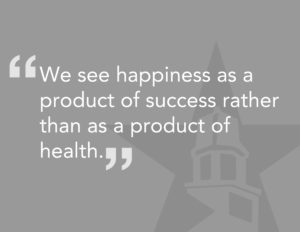What is happiness? At Houghton, there is constant pressure to make important decisions. What will my major be? What will I do this summer? Will I go to graduate school? In making these pivotal decisions, one must constantly discern what is truly important. While priorities during this short span of life are ever shifting, one thing that everyone wants is happiness. Unfortunately, the kind of happiness that is most desired, the kind that leads to deep peace and satisfaction, seems unbearably elusive.
 Recently, I found a contrarian model of happiness in an unlikely place, a history book called Sapiens by Yuval Noah Harari. The focus of Sapiens is on how Homo sapiens became the dominant species on earth, but Harari hides brilliant philosophical insights throughout. He argues that from an evolutionary perspective, humans are not designed to be happy. We have a baseline of happiness that we will always revert to, no matter how much we indulge our desires or how successful we are. This makes sense from an evolutionary perspective. If we would have been satisfied after hunting and eating only once, we would have starved. Likewise, if we would have been satisfied after mating just once, we would not have survived as a species. In other words, we are wired to only experience temporary satisfaction.
Recently, I found a contrarian model of happiness in an unlikely place, a history book called Sapiens by Yuval Noah Harari. The focus of Sapiens is on how Homo sapiens became the dominant species on earth, but Harari hides brilliant philosophical insights throughout. He argues that from an evolutionary perspective, humans are not designed to be happy. We have a baseline of happiness that we will always revert to, no matter how much we indulge our desires or how successful we are. This makes sense from an evolutionary perspective. If we would have been satisfied after hunting and eating only once, we would have starved. Likewise, if we would have been satisfied after mating just once, we would not have survived as a species. In other words, we are wired to only experience temporary satisfaction.
Harari suggests that there are only two things that can ever increase our happiness: physical health and meaningful relationships. From this perspective, our happiness is based purely on neurochemical reactions. This is actually quite encouraging since we have the power to create a healthful environment to optimize our brain’s functioning as an organ, in essence adjusting our baseline. Unfortunately, college is a health disaster. Three buffets a day and limited activity are far from optimal. In addition, many students put immense amounts of pressure on themselves to perform at a high level, causing stress, sleeplessness, and overall physical breakdown Finally, we subject ourselves to high levels of auditory and visual stimuli in the form of excessive media consumption, but we don’t match this with equal physical stimulus, resulting in neuromuscular tension and anxiety. Yet we wonder why we are miserable amidst so much opportunity and accomplishment. It is because we see happiness as a product of success rather than as a product of health.
 Meaningful relationships are the second component of happiness. By meaningful relationships, I do not mean friends and acquaintances. I certainly don’t mean the broad community here at Houghton. I mean life’s most precious relationships, including parents, children, spouses, fiancees, and extremely serious friends and romantic interests. Perhaps this is why so many students are unhappy. For the first time, their foundational relationships have been removed, only to be replaced by an onslaught of relationships that are incredibly shallow by comparison. These meaningful relationships are so important because as humans we crave recognition, but only recognition from those closest to us can satisfy this craving. This is why celebrities, who are “recognized” for their talents by millions, are often extremely unhappy. Shallow recognition is like junk food. It leaves people sick, not nourished. Another reason why these relationships are so essential is that they distract us from ourselves. I posit that much of our unhappiness stems from rampant self-absorption, and truly loving other people allows us to stop worrying about our own state.
Meaningful relationships are the second component of happiness. By meaningful relationships, I do not mean friends and acquaintances. I certainly don’t mean the broad community here at Houghton. I mean life’s most precious relationships, including parents, children, spouses, fiancees, and extremely serious friends and romantic interests. Perhaps this is why so many students are unhappy. For the first time, their foundational relationships have been removed, only to be replaced by an onslaught of relationships that are incredibly shallow by comparison. These meaningful relationships are so important because as humans we crave recognition, but only recognition from those closest to us can satisfy this craving. This is why celebrities, who are “recognized” for their talents by millions, are often extremely unhappy. Shallow recognition is like junk food. It leaves people sick, not nourished. Another reason why these relationships are so essential is that they distract us from ourselves. I posit that much of our unhappiness stems from rampant self-absorption, and truly loving other people allows us to stop worrying about our own state.
So how should we react to this contrarian and simple model of happiness? I personally find it comforting. According to this model, high GPAs, job offers, and overall success cannot bring lasting happiness. The things we are told to strive for most are not contributing to our happiness, and furthermore may be harming our chance at attaining it. Self-promotional academic and career goals that that are out of line with prioritizing God seem so vapid in comparison to a chance at true happiness brought by deep personal relationships and health.
Perhaps Harari is wrong. Maybe happiness isn’t that simple and there really is a goal out there that is so worthy that it could eternally satisfy. Personally, I find the evidence too compelling to ignore. I see too many miserable people slowly killing themselves with caffeine and alcohol and high fructose corn syrup. Likewise, I see them consume junk food of a different sort as they try to fill the pit of loneliness in their emotional stomachs with shallow relationships and cheap approval. For this reason, I am willing to take this gamble for happiness. As terrible as it sounds, I think I could endure a life of deep and loving relationships and healthy living.
Tyler is a sophomore majoring in math.
